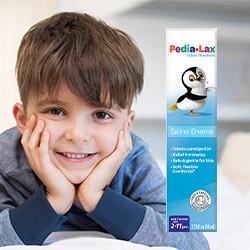Frequently Asked Questions
Our FAQ section should help you find the answers you need to resolve their constipation problem now and ways to avoid more problems in the future by changing their diet.
Frequently Asked Questions
General Questions
-
What is constipation?
A division of the National Institutes of Health defines constipation as having a bowel movement fewer than three times a week. Stools are usually hard, dry, small in size and difficult to eliminate. Children with constipation usually either have very large hard stools or hard pellet-like stools. Bowel movements are infrequent and often painful.
The American Academy of Pediatrics outlines normal frequency of bowel movements for children. See table below.
Age Bowel Movements Per Weeka Bowel Movements Per Dayb Adapted from Fontana M, Blanch C, Cataldo F, et al. Bowel frequency in healthy children.
Acta Paediatr Scand 1987;78;682-4.
a Approximately mean 2 SD.
b Mean.
Source: North American Society for Pediatric Gastroenterology, Hepatology and Nutrition0-3 Months Breast-fed 5-40 2.9 Formula-fed 5-28 2.0 6-12 Months 5-28 1.8 1-3 Years 4-21 1.4 More than 3 Years 3-14 1.0 -
What causes constipation?
Lots of things can cause constipation. Common causes include not getting enough fiber, fluids or insufficient exercise. In addition, with children, constipation is often caused by “holding it in” too long because they don’t want to stop playing to go to the bathroom. However, constipation can also result from a more serious medical condition. The first time your child experiences constipation, talk to your pediatrician for a complete diagnosis.
-
Is constipation normal?
Yes, completely. Constipation is a common problem for kids. Unfortunate, but true.
-
Should I panic if my child has constipation?
Not at all. Constipation is completely normal and a common problem for kids. Unfortunate, but true.
-
When should I begin to worry?
If constipation lasts for more than seven days after treatment, the child has persistent bouts with constipation or is in acute pain, they should see their pediatrician immediately.
-
How do I know it is constipation and not something else?
While it’s perfectly normal for your child to experience occasional constipation, it’s not normal for it to be prolonged or ongoing. If constipation lasts for more than seven days after treatment, you need to see a doctor to rule out a more serious medical condition or set up a treatment approach for a chronic constipation condition.
-
How is constipation treated?
Parents can often successfully treat constipation with diet changes and over-the-counter medicine. They should, however, seek the counsel of a healthcare professional for children aged 2 and under and/or the first time their child suffers from constipation.
-
How do I prevent constipation?
There are several things you can do to help prevent constipation. Make sure your child eats a well-balanced diet with plenty of fiber. They also need to drink lots of fluids and get plenty of exercise. Most importantly, encourage them to use the bathroom when they need to. Let them play a little longer outside or give them a reward when they stop for a bathroom break. If potty training, make sure you have scheduled “potty time.”
-
What is soiling?
Soiling is what happens when liquid feces leak out around hard, compacted stool. It can happen once or several times a day and is often confused with diarrhea. There is nothing a child can do to withhold it and parents don’t often make the connection between what they think is diarrhea and constipation, making the right diagnosis difficult.
Pedia-Lax® Questions
-
How does Pedia-Lax® work?
The active ingredients in Pedia-Lax® products work in several different ways to help relieve your child’s constipation.
The active ingredient in Pedia-Lax® Chewable Tablets, magnesium hydroxide, increases the amount of water in the intestine, which promotes bowel movement.
The active ingredient in Pedia-Lax® Liquid Stool Softener, docusate sodium, works directly on the stool to help soften it.
The active ingredient in Pedia-Lax® Glycerin Suppositories and Liquid Glycerin Suppositories, glycerin, attracts water into the stool and promotes bowel movement.
The active ingredients in Pedia-Lax® Enema, sodium phosphates, increase the amount of water in the intestine, which promotes bowel movement.
-
After I give my child Pedia-Lax®, how long before they’ll go?
Results will vary with each child and depend on which Pedia-Lax® product you use, anywhere from a few minutes to 72 hours.
-
Can I use Pedia-Lax® for my child under 2 years of age?
If your child is under age 2, consult your pediatrician.
-
Can I use Pedia-Lax® for my child over the age of 11?
Pedia-Lax® is indicated for children 2-11. Pedia-Lax® would not be unsafe for children over 11, but we recommend using an adult product by Fleet to ensure that the product will be effective for older children.
-
Can pregnant women take Pedia-Lax®?
Pedia-Lax® is designed for children ages 2-11. Pregnant women should consult their doctor before taking any medications.
-
Can my child take Pedia-Lax® when taking other medications?
As with any medication, consult your pediatrician if your child is already taking other medications.
-
Which Pedia-Lax® product should I use?
Choose from five different Pedia-Lax® laxative products. Chewable Tablets, Liquid Stool Softener, Liquid Glycerin Suppositories, Glycerin Suppositories and Pedia-Lax® Enema. The Pedia-Lax® product you choose will be determined by both the severity of the problem and the best delivery system for your child. And to help maintain your child's digestive balance* on a regular basis, try our Probiotic Yums.
If your child is uncomfortable because of constipation, we first suggest trying an oral product: chewable tablets or liquid stool softener. If your child’s constipation is more severe and you want the quickest relief possible, we suggest suppositories or enemas.
-
What’s the difference between the rectal and oral products?
Oral products are easy to administer and work over a short period of time. Rectal products provide immediate relief. Please see our product information page for details on each product’s reaction time.
-
What is the expiration date for these products?
The expiration date for Pedia-Lax® laxatives is printed on the outside of the carton.
-
How should Pedia-Lax® be stored?
Pedia-Lax® should be stored at a controlled temperature between 59°-86° Fahrenheit.
-
The dosing directions for Pedia-Lax® are by age range. How do I know what part of the range I should use for my child?
A dosing range by age provides greater flexibility for finding the right dose. As with any medicine, if you have questions or concerns, ask your pediatrician.
-
Is it OK for my child to take Pedia-Lax® laxatives every day?
Pedia-Lax® laxatives should not be taken for more than seven days in a row. If your child experiences constipation for more than seven consecutive days, consult your pediatrician.
-
Are your products gluten-free?
Yes.
Suppositories and Enema Questions
-
What’s the difference between the three rectal products?
Pedia-Lax® Enema is a saline laxative. Pedia-Lax® Liquid Glycerin Suppositories are a glycerin laxative administered in a liquid form applied with a disposable, no-mess applicator. Pedia-Lax® Glycerin Suppositories are small suppositories. They all relieve occasional constipation.
-
Is your Pedia-Lax® Liquid Glycerin Suppository latex-free?
Yes.
-
Can the Pedia-Lax® Liquid Glycerin applicator be used more than once?
No, they are designed to be used only once. Each applicator contains medication for one dose.
-
What is the source of your glycerin, animal or vegetable?
Vegetable.
-
Are Pedia-Lax® Glycerin Suppositories available in “infant” size?
No. Pedia-Lax® Glycerin Suppositories are designed for use in children ages 2-5 years. Talk to your pediatrician about use in children below age 2.
-
My child doesn’t do well with suppositories. Every time I get one in, he pushes it out. What can I do?
Try using Pedia-Lax® Liquid Glycerin Suppositories. They have the same active ingredient in liquid form and can’t be “pushed out” like a regular suppository because they are liquid.
-
My child is older than 5. Can I still use Pedia-Lax® Liquid Glycerin?
Children over the age of 5 can use Fleet Adult Liquid Glycerin.


